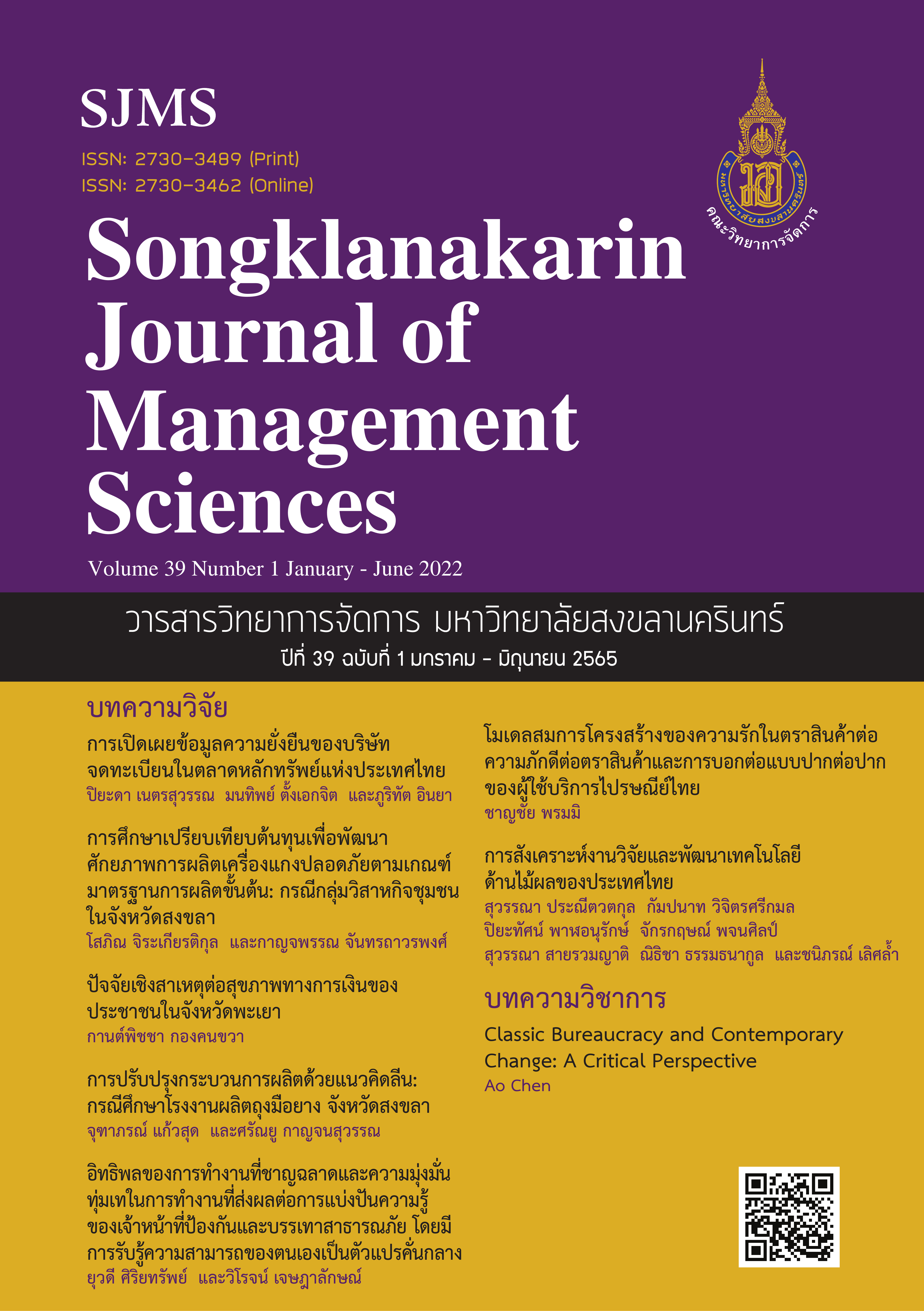ระบบราชการแบบดั้งเดิมและการเปลี่ยนแปลงร่วมสมัย: มุมมองเชิงวิพากษ์
Main Article Content
บทคัดย่อ
ระบบราชการดั้งเดิม (Classical bureaucracy) ถูกพิจารณาว่าเป็นรูปแบบองค์กรที่มีบทบาทสำคัญในทุกยุคทุกสมัย เนื่องจากระบบดังกล่าวมีลักษณะเฉพาะและประสิทธิภาพที่เหนือกว่า อย่างไรก็ตาม ภายใต้การพัฒนาอย่างรวดเร็วทั้งทางด้านเทคโนโลยี เศรษฐกิจ และสังคม ลักษณะเฉพาะที่เหนือกว่าและประสิทธิภาพของระบบราชการดั้งเดิมไม่อาจตามทันวัฒนธรรมธุรกิจร่วมสมัยที่เปลี่ยนแปลงไปอย่างรวดเร็ว และแม้กระทั่งไปขัดขวางการอยู่รอดและการพัฒนาองค์กรอย่างยั่งยืน ดังนั้น เพื่อรับมือกับสภาพแวดล้อมที่ไม่หยุดนิ่ง วัตถุประสงค์ของบทความนี้มีเพื่ออธิบายว่าองค์กรระบบราชการในปัจจุบันเปลี่ยนแปลงตัวเองเพื่อตอบสนองความต้องการของวัฒนธรรมธุรกิจหลังสมัยใหม่ด้วยแนวทางใด ผลการวิจัยสะท้อนให้เห็นว่าการเปลี่ยนแปลงดังกล่าวไม่ได้หมายถึงการล่มสลายของระบบราชการและไม่ใช่ว่าองค์กรรูปแบบใหม่เข้ามามีบทบาทเหนือกว่า แต่ในทางกลับกัน เป็นเพียงแค่มุมมองที่ถูกมองว่าระบบราชการยังคงมีวิวัฒนาการต่อไป ซึ่งมิใช่เป็นการปฏิวัติโดยสิ้นเชิง
Article Details

อนุญาตภายใต้เงื่อนไข Creative Commons Attribution-NonCommercial-NoDerivatives 4.0 International License.
บทความที่ตีพิมพ์ถือเป็นลิขสิทธิ์ของวารสารวิทยาการจัดการ มหาวิทยาลัยสงขลานครินทร์ อย่างไรก็ตาม กองบรรณาธิการไม่สงวนลิขสิทธิ์ในการทำซ้ำ คัดลอก หรือเผยแพร่ แต่จะต้องอ้างอิงให้ถูกต้องตามหลักวิชาการ
เอกสารอ้างอิง
Alazzawi, M. (2008). Bureaucracy. Retrieved March 26, 2020, from http://www.scribd.com/doc/2440655/Bureaucracy
Alvesson, M., & Willmott, H. (2003). Studying Management Critically. London: Sage.
Alvesson, M., & Willmott, H. (1996). Making Sense of Management. London: Sage.
Avgerou, C. (2000). IT and organizational change: an institutionalist perspective. Information technology & people, 13(4), 234-262.
Baruch, Y. (2004). Managing Careers: Theory and Practice. Essex: Prentice Hall.
Beetham, D. (1996). Bureaucracy. Minneapolis: University of Minnesota Press.
Bovens, M., & Zouridis, S. (2002). From Street-level to System-level Bureaucracies: How Information and Communication Technology is Transforming Administrative Discretion and Constitutional Control. Public Administration Review, 62(2), 174-184.
Buchanan, D., & Huczynski, A. (2004). Organizational Behaviour: An Introductory Text. Essex: Prentice Hall.
Casey, C. (2004). Bureaucracy Re-enchanted? Spirit, Experts and Authority in Organizations. Organization Articles, 11(1), 59-70.
Clegg, S., Kornberger, M., & Pitsis, T. (2005). Managing and Organizations: An Introduction to Theory and Practice. London: SAGE Publications Ltd.
Clegg, S. (1990). Modern Organizations: Organization Studies in the Postmodern World. London: Sage.
Cordella, A. (2007). E-government: towards the e-bureaucratic form? Journal of Information Technology, 22(3), 265-274.
Cordella, A., & Tempini, N. (2015). E-government and organizational change: Reappraising the role of ICT and bureaucracy in public service delivery. Government Information Quarterly. 32(3), 279-286.
Crouch, C., & Streeck, M. (1997). Political Economy of Modern Capitalism: Mapping Convergence and Diversity. London: Sage.
du Gay, P. (1994). Making up Managers: Bureaucracy, Enterprise and the Liberal Art of Separation. The British Journal of Sociology, 45(4), 655-674.
Eagleton, T. (2012). Why Marx was Right. New Haven: Yale University Press.
Fischer, F., & Sirianni, C. (1994). Critical studies in Organization and Bureaucracy. Philadelphia: Temple University Press.
Friedman, M. (2002). Capitalism and Freedom. Chicago: London: UCP.
Giddens, A. (1971) Capitalism and Modern Social Theory. London: CUP.
Johnson, P., & Gill, J. (1993). Management Control and Organizational Behavior. London: Paul Chapman.
Kallinikos, J. (2004). The Social Foundations of the Bureaucratic Order. Organization Articles, 11(1), 13-36.
Kilcullen, J. (1996). Max Weber: On Bureaucracy. Retrieved April 5, 2020, from http://www. humanities.mq.edu.au/Ockham/ y64l09.html
Littleton, S. M., Arthur, M. B., & Rousseau, D. M. (2000). The future of boundary-less careers, in Collin, A. and Young, R.A (Eds), The Future of Career, Cambridge: Cambridge University Press.
Mommsen, W. J. (1989). The Political and Social Theory of Max Weber. London: Polity.
Morgan, G. (2006). Images of Organization. London: Sage.
Perry, M. (2002). Marxism and History. Palgrave: Basingstoke.
Pugh, D. S. (1973). Organization Theory Penguin: Harmondsworth.
Rhodes, C., & Milani Price, O. (2011). The post-bureaucratic parasite: Contrasting narratives of organizational change in local government. Management Learning, 42(3), 241-260.
Sahay, A. (1998). Max Weber and Modern Sociology. London: Taylor and Francis Ltd.
Su, Y. (2007). Modern Western Management Schools. Shanghai: Fudan University Press.
Watson, T. (2012). Sociology, Work, and Organization. London: Routledge.
Weber, M. (1947). The Theory of Social and Economic Organization translated and edited by A.M. Henderson and T. Parsons, New York: Oxford University Press.

